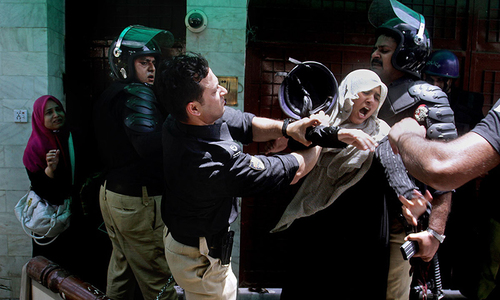A new full bench of the Lahore High Court (LHC) on Monday started hearing multiple petitions concerning the 2014 Model Town tragedy after a previously-constituted bench recused itself from hearing the case over "personal reasons".
The new bench — comprising Justice Abdul Aziz Sheikh, Justice Ameenuddin Khan, Justice Shehbaz Rizvi — said that most of the applications raise several serious questions that will need to be addressed in future hearings.
The bench decided to continue hearing the case on Monday, October 2 and ordered that all parties in the case be sent notices regarding the next hearing.
Earlier in the day, a full bench comprising interim LHC Chief Justice Yawar Ali, Justice Abdul Sami Khan and Justice Syed Shahbaz Ali Rizvi had taken up the government’s intra-court appeal challenging the decision of a LHC single-member bench in favour of releasing Justice Ali Baqar Najafi's inquiry report regarding the incident.
However, instead of taking the matter up, the bench ordered that a new full bench should be created to hear the Model Town case while sidelining itself from the case over "personal reasons".
A single bench comprising Justice Syed Mazahar Ali Akbar Naqvi had on Sept 21 ordered Punjab home secretary to make public the 'Justice Najafi report' and also provide a copy of the document to the families of those killed and injured in the incident.
The government in its appeal had questioned the jurisdiction of the single bench to decide the petition regarding the Model Town inquiry report, saying the eight identical petitions on the same matter were already pending before a full bench.
The appeal had said the government was neither asked by the single bench to file any reply or any written statement, nor was put on notice for what alarmingly turned out to be the final hearing and that the government was not even told to address arguments on the merits of the case relating to Article 19-A of the Constitution.
It had said the government was also not allowed an opportunity to establish as to why the release of the report would be contrary to public order and against the national interest.
The government had said the impugned judgement by the single bench was a classic case of misdirection in law, unreasonable and failed to take into consideration settled laws. The verdict in question also violated judicial and procedural propriety and had been rendered in gross violation of the government’s right to a fair adjudication, it added.
Questioning the merits of the impugned judgement, the government had said the single bench failed to take into consideration the law holding the proceedings of commission of inquiry as not judicial proceedings and merely a fact-finding exercise, purely preventive in nature and only meant for the facilitation of the executive branch of the state.
It further had said the single judge failed to take into account the fact that purpose of establishing of an inquiry tribunal was to establish the facts and causes of the subject matter of the inquiry and to make recommendations that may prevent the recurrence of such undesirable events in future. The role of such a tribunal was not to reach conclusions regarding the civil or criminal liability of any person, it added.
The government had pleaded that the single judge also committed an error of law by not appreciating the context, contours and relevance of a report prepared by an inquiry commission/tribunal inasmuch as the commission was only a fact-finding body meant only to instruct the mind of the government without producing any document of a judicial nature.
The appeal had maintained that the government was not required under the law to pronounce one way or the other on the findings of the commission as its recommendations were not enforceable and the exercise leading to the report was not a judicial procedure.
The government had asked the division bench to accept its intra-court appeal and set aside the impugned judgement passed by the single judge.
In a separate appeal, the families of the victims had demanded that Chief Minister of Punjab Shahbaz Sharif, the chief secretary of the province and the home secretary should be held in contempt for failing to make the report public despite the court's orders.













































